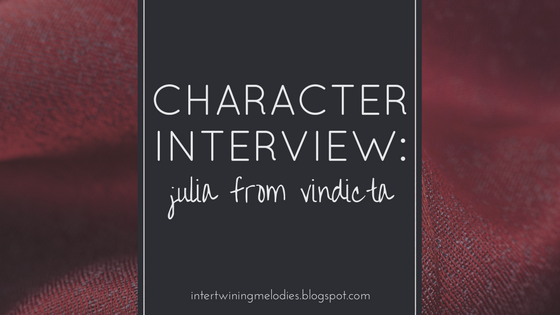Plot: Conflict and Tension
I think I'm going to be doing a very informal series on this blog about plots. I'm not sure when I'll post parts of it, but I'll let you know when a post is part of the series. Last week's post will be the first installment, and this is the second!
These two posts are a little more in-depth and whatever partly because I'm doing a website assignment thing for my writing class, so I'm putting in a little more effort than I usually do. Trying to get that quality content, peoples! ;)
So this week I'm going to talk a little bit about how to keep your plot moving along. I'm sure if you've ever attempted to write a story, you've struggled with your plot. I think it's pretty much the universal writers' bane at some point. (If that's not the case for you, please teach me!)
The most important part of writing a book (or at least a very, very important part) is to keep the reader's attention. If the reader gets bored, you've lost the battle. At least, I know I don't want to keep reading a book that's just boring.
So how do you keep your readers attention? (You probably already know the answer to this question from the topic of this series, but I'm running with this. XD)
Sure, interesting characters, lots of action, well-written dialogue and so on can all help, but ultimately plot will be the determining factor in whether or not your reader will turn the page.
Now that I've completely convinced you that plot is important, here are some tips on how to keep it compelling. Obviously, I'm only covering a few ways to keep your plot interesting. I'll probably be adding to it as inspiration hits.
The two things I'm going to hit on are very similar but have slight differences.
These two posts are a little more in-depth and whatever partly because I'm doing a website assignment thing for my writing class, so I'm putting in a little more effort than I usually do. Trying to get that quality content, peoples! ;)
So this week I'm going to talk a little bit about how to keep your plot moving along. I'm sure if you've ever attempted to write a story, you've struggled with your plot. I think it's pretty much the universal writers' bane at some point. (If that's not the case for you, please teach me!)
The most important part of writing a book (or at least a very, very important part) is to keep the reader's attention. If the reader gets bored, you've lost the battle. At least, I know I don't want to keep reading a book that's just boring.
So how do you keep your readers attention? (You probably already know the answer to this question from the topic of this series, but I'm running with this. XD)
Sure, interesting characters, lots of action, well-written dialogue and so on can all help, but ultimately plot will be the determining factor in whether or not your reader will turn the page.
Now that I've completely convinced you that plot is important, here are some tips on how to keep it compelling. Obviously, I'm only covering a few ways to keep your plot interesting. I'll probably be adding to it as inspiration hits.
The two things I'm going to hit on are very similar but have slight differences.
Conflict
Conflict is something that is the backbone of a plot. It's what makes a plot interesting. Without conflict, there is basically no plot. If your story was all about a beautiful girl walking through a meadow with sunshine and flowers and not a care in the world, no one will read it. It's not interesting.
But add some conflict in there - a bee chasing the girl, or a thorn stuck in her foot - and it becomes more interesting. Even though I would recommend having a lot more to your plot. :P
So how exactly do you add conflict? There are basically four types of conflict: with themselves, with another person, with society/culture, or with nature. Make the girl in the example above be trespassing on land and you have a conflict with culture (or another person if the land's owner shows up).
Other ways of adding conflict include raising the stakes (the girl's brother is dying and she needs to get to him), eliminating the options (there's no bridge so she has to swim across the river, but she can't swim well), isolating your character (the friend making the journey with her drowns - or something like that), or start a time bomb (her brother will be killed by midnight and it's nine at night).
As you can see, all those options would immediately make your story more interesting. If you are really stumped, ask yourself: what is your character trying to do? It could be as simple as getting milk from the store or as important as saving the world, but find out what it is.
Then ask: what is the worst possible thing that could happen right now? The car stalls or your character gets in an accident. The aliens trying to take over earth start inhabiting humans. That last one's a little weird but you get my point.
But add some conflict in there - a bee chasing the girl, or a thorn stuck in her foot - and it becomes more interesting. Even though I would recommend having a lot more to your plot. :P
So how exactly do you add conflict? There are basically four types of conflict: with themselves, with another person, with society/culture, or with nature. Make the girl in the example above be trespassing on land and you have a conflict with culture (or another person if the land's owner shows up).
Other ways of adding conflict include raising the stakes (the girl's brother is dying and she needs to get to him), eliminating the options (there's no bridge so she has to swim across the river, but she can't swim well), isolating your character (the friend making the journey with her drowns - or something like that), or start a time bomb (her brother will be killed by midnight and it's nine at night).
As you can see, all those options would immediately make your story more interesting. If you are really stumped, ask yourself: what is your character trying to do? It could be as simple as getting milk from the store or as important as saving the world, but find out what it is.
Then ask: what is the worst possible thing that could happen right now? The car stalls or your character gets in an accident. The aliens trying to take over earth start inhabiting humans. That last one's a little weird but you get my point.
Tension
Tension is very similar to conflict, but it's not quite the same.Conflict is the problem your character is trying to overcome. But if your character is trying to write a book and that's it - there's no deadline, no problems, just something that's taking time to do - it's not going to be interesting.
Tension is what adds interest. It's when the readers know conflict is coming, or the emotion they feel when something unexpected happens. Maybe the best way to define it is a sense of urgency. The reader needs to be stretched emotional, to feel.
There are many good ways to add tension. Some include adding a time bomb (literally or figuratively), making your character worry (this could get a little obvious, though, so be careful with it), or non-stop action (fights and death, etc., but this could also get old).
Make the character worry about having to live up to unrealistic expectations, or make the main character (or a secondary character) have a flaw - like lying or selfishness or a lack of courage. Your reader will naturally wonder if they will overcome that flaw, and it will add tension.
If all else fails, just think what's the worse thing that could happen right now? And boom! Just like that, the only boat to leave the island full of bloodthirsty wildcats gets blown up. Tension added! :P
Of course, asking that question is the same device that you can use to add conflict so you can see how tension and conflict are really very similar. Even if it's hard to tell the difference between them sometimes, know that you need both to have a good story - a story that will stay interesting and make people want to keep reading.
Of course, asking that question is the same device that you can use to add conflict so you can see how tension and conflict are really very similar. Even if it's hard to tell the difference between them sometimes, know that you need both to have a good story - a story that will stay interesting and make people want to keep reading.
Well, that's it for this week!! Thanks for reading. :)
~ Anna Iolene






Comments
Post a Comment